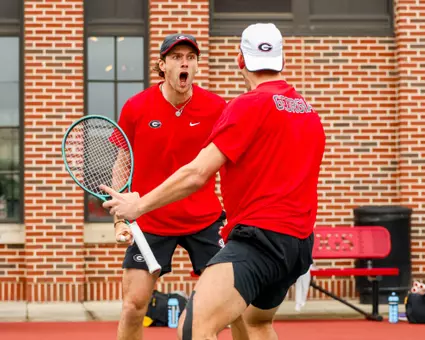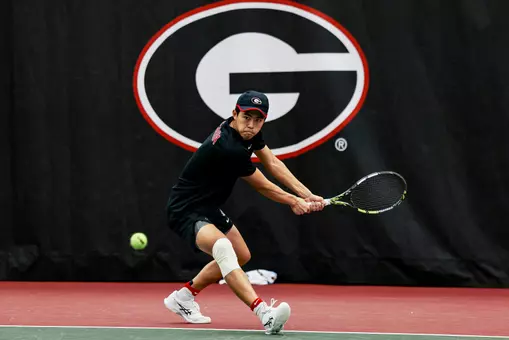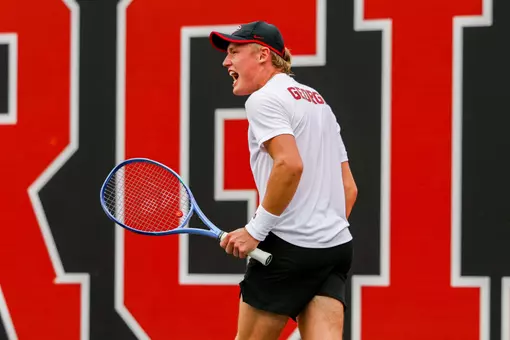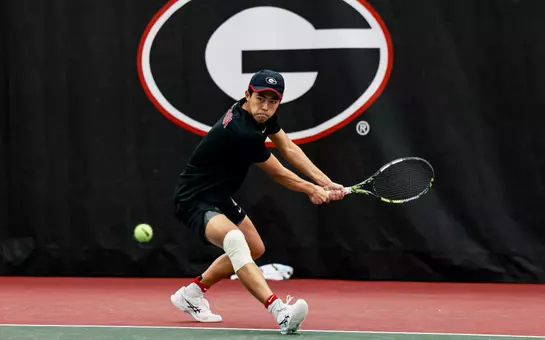University of Georgia Athletics
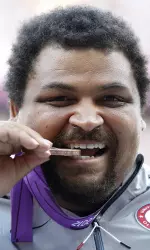
Volunteer coaches giving and getting
October 22, 2015 | Men's Tennis
By John Frierson
UGAAA Staff Writer
Enrique Rodriguez was earning a paycheck a year ago as the assistant women's soccer coach at The Citadel, where he'd been since 2008. It wasn't big, but it was compensation for a lot of hard work. Before that the Colombia native was an architect. For real, not in the George Costanza way.
Now, as the volunteer assistant coach for Georgia's women's soccer program, there is still lots of hard work, but no paycheck.
A married father — his wife is a microbiologist that works about 45 minutes from Athens in Social Circle, which prompted the move to the area — Rodriguez said at this point in his life he wouldn't have become a volunteer coach at just any school, "but Georgia's not just any school." And that's why he's here, putting in the time, learning and doing all he can.
"It's a great opportunity and the learning curve you get in the Southeastern Conference and at Georgia, in terms of resources and student-athletes and coaches, it's a different level" Rodriguez said. "I want to be at that level."
During this fall semester, Georgia sports have a dozen volunteer assistants, spread over eight programs. Track and field has the most with four (all world-class performers that are still competing, including former Bulldog world champion shot putter Reese Hoffa), while some of Georgia's volunteers are right out of college or close to it, such as the men's tennis team's Nick Papac.
And then you have someone like Rodriguez, who is following a less traditional path.
"It's a situation where you have the freedom and you can do as much as you want, and you have a chance to prove yourself," said Rodriguez, who was hired by women's soccer first-year coach Billy Lesesne. "As much as you want to do, you have the freedom to do it. And head coaches love it when you do more."
Volleyball volunteer assistant Brian Muesenfechter summed up the situation nicely: "Really, it's about getting experience and creating options for yourself."
Volunteer assistants are much like interns, working for nothing while gaining valuable experience in the field they wish to pursue. And like interns at a major company, their duties from day to day can vary from the mundane (like raking the long jump pit or collecting balls at the end of practice) to actively coaching players during practice.
Hoffa, who earned a bronze medal at the 2012 Summer Olympics and is hoping to close out his career next year with a fourth Olympics appearance, in Rio, is already a familiar sight at Spec Towns Track. The five-time All-American at Georgia has long trained under Georgia throws coach Don Babbitt and has called Athens home for many years.
The 38-year-old Hoffa wants to coach when he's done competing and has started Hoffa Throws Academy in Watkinsville. Volunteering at Georgia, he said, is about preparing for his future and helping the place that helped him reach the top of his sport.
"It's a unique opportunity to give back to the university," said Hoffa, a three-time U.S. Outdoor champion, 2006 World Indoor champion and 2007 World Outdoor champion.
And just because Hoffa has been among the very best shot putters in the world for the past 15 years doesn't mean he's above doing some grunt work.
"If for some reason Don can't make a practice or something, I'll step in, or if he needs me to clean up a storage shed or something, I'll be there to help him," Hoffa said. "Whatever they need, I want to make sure I'm there for them."
Muesenfechter, all 6-foot-7 of him, had a very good career playing at Division II Lewis University, in Romeoville, Ill. After graduation he was a graduate assistant for the men's program at Missouri Baptist University for a couple of years before joining Lizzy Stemke's staff at Georgia last season.
"I got a phone call from here and it was almost a no-brainer," he said. "I got to see Liz's background and it just opened up a whole new avenue. I'm not sure where it will lead but I think it will bring more opportunities."
Stemke said Muesenfechter's physical abilities make him a tremendous asset at practice, and now in his second year on staff his coaching contributions have increased dramatically.
"He is still a great physical presence in the gym, obviously, but more importantly we're getting to take advantage of and see his contributions with his voice and with his eye," Stemke said. "He was a great player in college, so there's a lot of knowledge there that these girls are getting."
Joining Hoffa as volunteer assistants on the track and field staff are two-time Olympian in the decathlon, from Chile, Gonzalo Barroilhet; former Georgia All-American jumper, and two-time Olympian for St. Lucia, Levern Spencer; and Jarryd Wallace, a Paralympic sprinter and son of Georgia women's tennis coach Jeff Wallace, who in August set a world record in the 100-meter T44 event during the Parapan American Games in Toronto.
New track and field head coach Petros Kyprianou said the volunteer coaches, who will train at Georgia and coach when they're available, will make the Bulldogs better just by being there. And they're bringing a lot more to the table than just their impressive resumes.
"It's another experienced pair of eyes, actually four sets of experienced eyes," said Kyprianou, who coaches Spencer and Wallace on top of his Georgia duties. "It's a way for them to train with the team, and I'll tell you this, there's no better way demonstrate to the team what you're trying to teach. They can show it better than I can."
Gaining valuable experience and contacts is all well and good, but Georgia Power and AT&T aren't going to wait for you to get a job before paying your bills. Most volunteer coaches (track athletes still competing are in different situations) pick up extra money wherever they can, whether it's private lessons, working summer camps or having day jobs.
Papac, who last spring was on Oklahoma's men's tennis team (coached by former Georgia All-American John Roddick) and is now Georgia's volunteer coach, teaches private lessons three or four days a week, he said. Georgia associate head coach Bo Hodge, a former Bulldog All-American and volunteer assistant, was on Roddick's staff at Oklahoma last year, prior returning home to Athens to work with Manuel Diaz here, and it was Hodge who reached out to Papac about joining the Dogs.
"I was teaching at a club all summer in Nantucket and I found out over the summer that Bo was coming here," Papac said. "My coaches at Oklahoma knew that I wanted to get into coaching after graduation and so Bo wanted to see if I would be interested in coming here and being the volunteer. And so I just jumped at the opportunity."
Papac is not only working with Diaz and Hodge, he's living in the basement of Hodge's parents' house. Mark, who played football for the Bulldogs, and Suzette Hodge have been regulars around the Georgia program for more than 15 years.
"I couldn't be more thankful for the Hodge family and the living situation; honestly, it's very nice," Papac said.
What's unusual for Papac is that he was a Sooner in 2014-15 when Oklahoma beat Georgia twice. Now he's helping coach the Bulldogs.
"Those (Georgia) seniors, who I was actually good friends with, and I'm still good friends with, now I have to play a coach's role with them," he said. "I don't give the seniors as much direction as Bo and Manny can do, for obvious reasons. With the freshmen, I feel like I'm having an impact."
NCAA rules limit some of what volunteer coaches can do, primarily in recruiting. But there's plenty of other work to do, said Javonie Small, who was a volunteer assistant with the track program before being promoted to director of operations this season. As a volunteer, Small used to work at Fowler Drive Elementary School during the day before attending track practice in the afternoon.
Not getting a paycheck for a lot of hard work can be tough, Small said, even when you know you're getting something else out of the experience, whether it's knowledge or contacts in the profession.
"If you're going to volunteer in anything, you have to have the passion," he said. "If you don't then you're going to get burned out fast."
Special little things, like a phone call, do help.
"There are those moments that say, it's worth it," he said. "One time I was like, I'm doing all this work and there's no calls, no job offers, and my grandmother called and said, "We saw you on TV!" I had no idea. It was during the (NCAA Indoor Championships) and she saw me on TV.
"Just those little moments give you something, give you the energy to keep doing it."
Muesenfechter said what he's learning since arriving at Georgia starts with "just being a day to day professional" and extends well beyond that.
"Everybody sees you in the gym and everybody sees you at your matches and things, but there's so much that goes on behind the scenes, things that I wouldn't have been comfortable with leaving here and going to another program and saying, I know how to do all this stuff," he said. "Now I have a much greater grasp ... of the things behind the scenes that you're only learning by observation."
John Frierson is a staff writer for the UGA Athletic Association and curator of the ITA Men's Tennis Hall of Fame. You can follow him on Twitter: @FriersonFiles and @ITAHallofFame.

